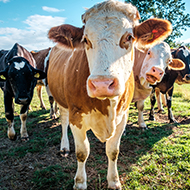Bovine TB vaccine field trials given go-ahead

More than 40,000 cattle are slaughtered as a result of bTB infection annually.
Bovine TB (bTB) cattle vaccination trials have been given the go-ahead in England and Wales in a bid to develop a cattle vaccine by 2025.
The trials, which follow 20 years of research by government scientists, will be conducted over the next four years on behalf of Defra, the Welsh Government and the Scottish Government.
The UK's Chief Veterinary Officer, Christine Middlemiss, said that the research has been 'pivotal' in developing a potential vaccine.
“Whilst there is no single way to combat this damaging and complex disease, cattle vaccination is a potential new tool for our multi-pronged approach to tackle it and importantly prevent it, providing vital support to our farming communities,” she said.
“Bovine TB presents a global challenge and the UK has harnessed its world-leading science to develop potential solutions such as vaccination and new diagnostic tests that could also be valuable to other countries.”
The vaccine trials are one of several measures to eradicate bTB in England by 2038. Other measures include plans to phase out intensive badger culling in England, improve the cattle testing regime and vaccinate more badgers against the disease.
Environment Secretary George Eustice said: “Bovine TB is a slow-moving and insidious disease which can cause considerable trauma for farmers as they suffer the loss of highly prized animals and valued herds.
“This scientific breakthrough is a major step forwards in our battle to see the disease eradicated from this country. As wider preventative measures like cattle vaccines are introduced, we will accelerate other elements of our strategy and start to phase out badger culling in England, as no one wants to continue the cull of a protected species indefinitely.”
The British Veterinary Association said that the deployment of a viable cattle vaccine has the potential to be an 'absolute gamer changer.'
“These field trials mark the culmination of years of ground-breaking research and efforts by the veterinary scientific community to expand the range of tools available to vets and farmers to tackle bovine tuberculosis,” he said.
BTB is one of the most problematic animal health challenges in the UK. Every year, more than 40,000 cattle are slaughtered as a result of bTB infection.
Researchers say a vaccine could become a powerful tool in the battle against the disease following the necessary testing and efficacy approvals.



 The Veterinary Medicines Directorate (VMD) is inviting applications from veterinary students to attend a one-week extramural studies (EMS) placement in July 2026.
The Veterinary Medicines Directorate (VMD) is inviting applications from veterinary students to attend a one-week extramural studies (EMS) placement in July 2026.